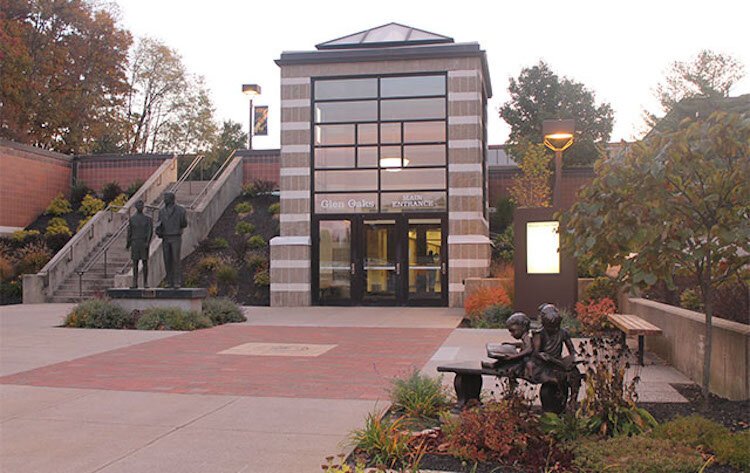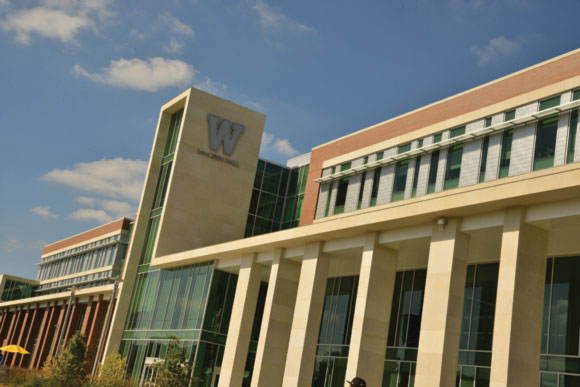WMU trustees freeze tuition, housing costs in response to pandemic. Glen Oaks offers students grants
There will be no increase in tuition or room and board for Western Michigan University students in the academic year that begins this fall. The WMU Board of Trustees have frozen rates at the current year's levels.
There will be no increase in tuition or room and board for Western Michigan University students in the academic year that begins this fall. The WMU Board of Trustees have frozen rates at the current year’s levels.
Potential students can calculate their expenses here.
In taking the action, university officials say they wanted to create certainty for students “around the cost of their education and demonstrate that WMU remains committed to affordability.” The action was detailed in a release regarding the vote at a recent board of trustees meeting.
In some years, trustees set tuition in June, when there’s more clarity around how much the university will receive from the State of Michigan. “But, before this current academic year concluded, leaders felt it was important for students to know what to expect in 2020-21,” the release says. The spring semester ended the week of April 20, as does the regular academic year.
“It is our responsibility to be careful and responsible stewards of the financial resources entrusted to us by our students and their families as well as the state’s taxpayers,” President Edward Montgomery says. “We simply cannot continue to operate at anywhere near business-as-usual, WMU’s first source of revenue—72%—comes from the tuition and fees that students and their families pay.”
WMU earns approximately $100 million from campus operations that house and feed our students and support academic and cultural events and athletics. Social distancing requirements have dried up these sources this spring and summer and they are likely to be significantly down in the fall as well.
The second source of the university’s revenue, just over $100 million, or about 20%, comes from the state of Michigan.WMU officials anticipate a reduction in state support. For example, the last time the state faced significant budget challenges in 2011, WMU lost $16 million of state support.
WMU’s endowment provides approximately $11 million in support for everything from scholarships to lectures and arts performances to faculty. The endowment’s market value has declined by 13%, adversely affecting support to a broad array of programs and activities. Most of those funds can only be used in the ways donors specifed. “We must and will honor these commitments we made to our donors so that the endowment can continue to support students and programs into the future,” Montgomery says.
The school’s largest source of revenue, just over $300 million—comes from the tuition and fees that students and their families pay. “The strains on their budgets are growing,” Montogomery says. “As a student-centered university, we must respond to their challenges accordingly. That’s why we are pleased to recommend that the board freeze tuition as well as room and board rates.”
The release goes on to say that WMU itself is under financial strain as a result of the nationwide economic slowdown caused by the coronavirus. The outbreak’s economic impact has created severe budgetary challenges for higher education institutions across the state and nation.
At the April 23 meeting, the president outlined those challenges for WMU, including more than $45 million in losses due to the crisis this year thus far and a projected $45 to $85 million in additional losses next fiscal year.
Some examples of lost revenues: credits for room, board, and parking; increased expenses due to moving the summer I session to distance education at the school’s lower online tuition rate, combined with associated lost housing, dining and fee revenue; increased custodial costs; curtailed revenue in fitness, event, and cultural facilities; lost NCAA distributions; lost state funding for specific research and clinical practices; and declines in available spending due to market declines in WMU’s endowment.
WMU is developing a range of strategies to navigate and overcome the downturn. Early on, the president’s cabinet forfeited two weeks of leave or more each. On April 23, they went further with a 10% pay cut for all senior executives—the president, each vice president, General Counsel, Chief of Staff and Director of Intercollegiate Athletics. In addition, all associate and assistant vice presidents, associate provosts and vice provosts, and deans will take a 5% pay reduction.
However, the moves by Kalamazoo County’s third-largest employer has drawn the criticism of the WMU Chapter of the American Association of University Professors.
In an April 22 statement, the WMU American Association of University Professors chapter says many WMU employees learned from their supervisors April 17 not to expect work for the next five weeks, or to expect drastically reduced hours.
In response, the WMU AAUP says: “To date, decisions involving curriculum, curriculum delivery, and future fiduciary practices in response to the pandemic have been done behind closed doors. Decisions relating to the educational process should be made after consultation with the faculty and academic staff through their unions and through campus governing bodies. Financial exigencies used to justify harsh decisions about employment should be communicated transparently and completely. “
“We are surprised and deeply saddened to witness the dismissal of our colleagues, to hear that they are being asked to deplete their sick and annual leave, and then take unpaid leave,” the statement goes on to say.
“We strongly admonish the lack of transparency guiding the decisions resulting in the reduction and elimination of the ‘non-essential’ and ‘conditionally essential’ employees. We must work together, to both clarify challenges and create solutions, that do not irreparably damage this university that we all love. As we work to protect students, we must also protect the employees who make WMU work.”
“We will be strategic and continue to focus on short- and long-term needs as we move forward,” Montgomery says. “Western Michigan has faced major challenges before over the past 117 years, whether it was the Great Depression, the Great Recession or numerous other challenges. We have risen to each of these challenges, invigorated by our mission: ‘So that all may learn.’ I am convinced we can and will do so now.”
Source: Western Michigan University and WMU AAUP

Glen Oaks to award more than $288,000 in CARES Act emergency funding to eligible students
Glen Oaks Community College in Centreville will award $288,341 in emergency grants to assist eligible students whose lives and education have been disrupted by the coronavirus outbreak.
The funding is part of the overall $6 billion package from the U.S. Department of Education through the Higher Education Emergency Relief fund, authorized by the Coronavirus Aid Relief, and Economic Security (CARES) Act in early April.
“We are so pleased for our students who will receive these funds to help them through this challenging time in their educational journey,” says Glen Oaks President David Devier. “We look forward to continuing to serve them going forward.”
Students must meet a number of criteria in order to be eligible for these grants. High school students are not eligible. Students who were enrolled in face-to-face classes for the Winter 2020 semester should visit here for detailed requirements.
“We know that many students’ lives were affected by the COVID-19 outbreak in many ways,” says Tonya Howden, vice-president of student services. “Many of our students are struggling to meet basic needs, such as housing and food as they or their family members may now be unemployed. Others lack access to computers or the internet and we are encouraging students to use these funds to help them meet these needs.”
Students may use the emergency grants to cover expenses related to the disruption of campus operations, including cost of course materials, technology, food, housing, healthcare, and childcare. The emergency grants will not need to be repaid.
Amounts allocated to students will be determined by eligibility requirements and the number of credit hours in which students were enrolled during the Winter 2020 term. Students were notified of the grants through a college-wide email on April 27.
If students have questions regarding eligibility for the emergency funds, they should contact the Financial Aid Office at (269) 294-4260 or financialaid@glenoaks.edu.
Source: Valorie J. Juergens, Glen Oaks Community College















